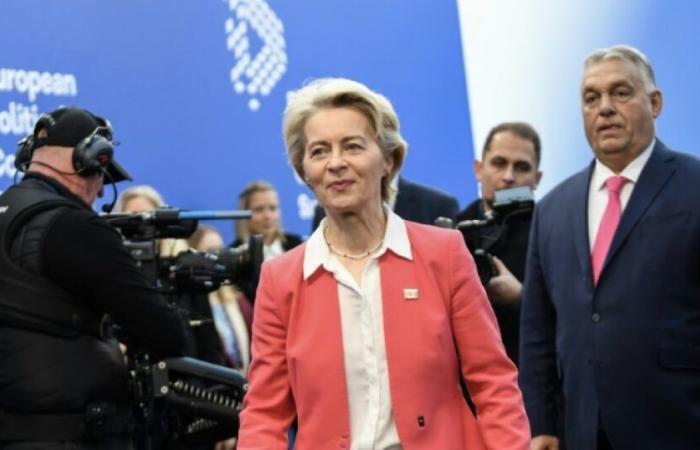Under pressure from the United States of Donald Trump, the Twenty-Seven, meeting at a summit in Budapest, are launching a long-term reform plan inspired by former Italian Prime Minister Mario Draghi on Friday to try to get the European economy out of the crisis. 'rut.
The project constitutes the heart of the second mandate of Ursula von der Leyen, the president of the European Commission reappointed this summer. However, between divergent interests and ideological disagreements between member states, its success is anything but guaranteed.
Europe must revive its growth through massive investments in digital innovation, the green transition and defense industries, estimates Mario Draghi in a 400-page report that he presented in early September in Brussels and that he is coming defend in Budapest.
Its observation is grim and clear: Europe is suffering an economic decline compared to the United States and is dangerously increasing its dependence on China for certain raw materials and strategic technologies.
Per capita income “has increased almost twice as much in the United States as in Europe since 2000,” he emphasizes.
– “Slow agony” –
If it does not make radical changes, the EU will experience “a slow agony”, he warns.
A warning which took on another dimension this week after the election of Donald Trump as President of the United States. The American billionaire has promised to tackle the EU's trade surpluses by imposing taxes on imports.
The former president of the European Central Bank estimates the necessary investments in the Old Continent at between 750 and 800 billion euros per year, an effort greater than the Marshall Plan of the United States which supported the reconstruction of Europe after the Second World War. world war.
This investment wall is a huge challenge for the 27 EU countries as they try to reduce their debt and budget deficits.
It is to be expected that the discussion of European heads of state and government on Friday will “focus on financing, financing and financing”, summarizes a European diplomat.
EU leaders recognize “the urgency of decisive action”, in a draft joint declaration which takes up the main areas of work put forward by Mario Draghi: deepening the single market, capital markets union, implementation of a trade policy that defends European interests, regulatory simplification, etc.
– Risk of “beautiful declarations” –
On the financing aspect, the Twenty-Seven recognize that it will be necessary to mobilize “both public and private financing” and affirm that they want to “explore all the instruments and tools”, a controversial mention which in itself sparked long talks .
Germany and other “frugal” countries in northern Europe are in fact excluding any recourse to new common debt, despite the success of the historic post-Covid recovery plan of 800 billion euros initiated in 2020. For these countries, the proposal defended by Mario Draghi, with the support of France, remains a red line.
They could, however, consider public financing via the European Union budget or increased recourse to the European Investment Bank.
Greater emphasis will be placed on private financing by mobilizing European savings towards the needs of businesses and by breaking down national barriers which prevent the creation of a true internal financial market.
“The Draghi report constitutes a solid basis for preparing proposals” from the European Commission, underlines a senior EU official. The first concrete proposals are not expected for several months and the implementation of the reforms should be spread over several years.
Beyond the Budapest declaration, member countries risk getting bogged down in endless debates. In addition to the problem of financing, their interests diverge on the union of capital markets, a veritable sea serpent of European summits.
The creation of a union of telecommunications, energy or defense industries has also been blocked for years.
For Sylvie Matelly, director of the Jacques Delors Institute, the risk is that “States produce beautiful declarations but there is not much behind them”.
EU leaders “can all agree that we must invest massively, but how can we do this with Germans who are not determined to change the paradigm on debt?”






